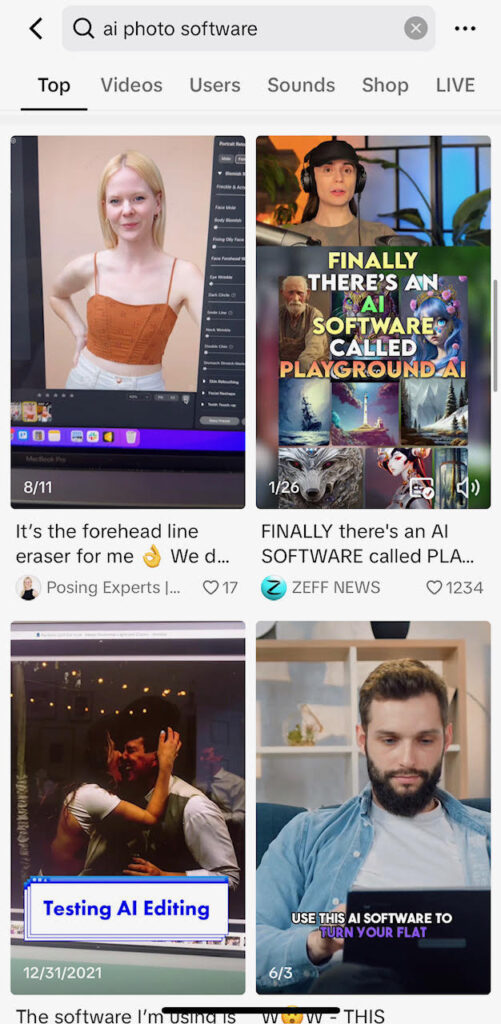The landscape of information discovery is continually evolving. Historically, one would have to lug an enormous book off a library shelf to find the answer to so much as a simple research question. Then, Google and Bing revolutionized the process with an easy click. Chances are, these are still very much your go-to.
But, social media platforms like TikTok have been giving even major search engines like Google a run for its money as of late. And this has been especially true for younger generations like Gen Z, showing how—yet again—with time, technology, and generations, everything can change.
The Rise of Social Search
According to a new survey by Her Campus Media, 51% of respondents have said that their preferred search engine was TikTok over Google. But it’s not only TikTok that is making waves in the discovery landscape. According to Tinted’s State of Social and User-Generated Content Report, 75.78% of consumers say they use social media to search for and discover new products and brands.
The once-dominant search engines are now facing formidable competition from improved search functionalities embedded within popular social media platforms, such as TikTok and Instagram. As this trend gains momentum, marketers need to rethink their digital marketing strategies to ensure visibility.
The impact of social search at work
As a social media strategy consultant who spends the majority of her time on TikTok searching for trends, brands, and influencers, I have seen first-hand the impact of social search and discovery. Whenever I am looking to seek the latest trends, I instinctively go to TikTok’s search bar and start typing away keywords.
Personally speaking, I also heavily use Instagram and TikTok’s search functionalities before I travel anywhere, to scope out the must-see spots in certain destinations.
Furthermore, I can’t ignore the impact of social discovery on driving purchasing behavior. Take #TikTokMadeMeBuyIt for example, a movement that gives credit to the social channel for helping brands and products shine in the spotlight.
@tech_billionair What do you want the mini printer to print for you?🤔 link in bio #fyp #foryou #tiktokmademebuyit #tiktokshop #giftideas #printer #miniprinter #printersoftiktok #thermalprinter #stickprinter
♬ 오리지널 사운드 - tiktokmademebuyit
People and brands are leveraging social channels to not only connect with customers but also drive reach through relatable and dynamic social content that drives conversions.
In fact, according to the same Tinted report mentioned above, 68.75% of consumers have admitted that they made a purchase based on something they saw on social media. And I’m guilty of this as well–just this past Black Friday I made three purchases all within Instagram or TikTok.
Why Is Social Search So Effective?
So, why is social search gaining momentum and proving to be so effective? Because of Social SEO. While hashtags can help categorize content, the key to boosting discovery lies in keywords within the content, as this allows social algorithms to feed the right content to the right audience, improving visibility.
How Social Search Works
Before I dive into the top tips you can implement to drive discovery, let’s first take a step back to understand the differences between traditional search engines and website SEO, and social search.
The majority of internet users may go to Google to search for new products and brands, often perusing reviews to make an informed decision. Similarly, via social, users can search keywords to seek out relevant content that will help them discover new products and brands.
In both cases, content is king. However, social media’s search capabilities are more dynamic and visual than a traditional search engine.
Through social search, a user will see beyond text-based search and reviews, gaining access to a more visual world that feels personalized and trustworthy, as they discover user-generated content like images and videos that are detailed and engaging.
Social search also combines the power of storytelling with SEO, because the content isn’t just being served for having high-quality keywords–it is the content’s quality that ultimately nurtures and pushes discovery.
Imagine this: a consumer is seeking to purchase new AI software. Searching for this via keywords on social channels will pull relevant results like a search engine would, but the content is arguably more authentic and dynamic.

Now with the growing demand for personalization, convenience, and authenticity that is being experienced via social search, the entire landscape of search behavior is going through a change—one that Google is acknowledging with steps to integrate social content into its web search results.
This will combine traditional search results with social media profiles and content, such as TikToks and Instagram Reels.
And the integration of search and social will only get better. In Google’s recently published 100 most searched products for the year, you see that many of the products were actually discovered via TikTok, which demonstrates how impactful this channel is to attribution. This has caused marketers of all stripes to take note, and consider how they can adjust their content strategy designed for search to perform in social algorithms.

Leading Platforms In Social Search
When looking at social media channels specifically, it is no surprise that TikTok is leading the charge. In fact, this social platform is so confident in its search capabilities that it launched a new ad offering called ‘Search Ads’ allowing brands to appear during a search query.
When a search journey starts, a user will begin to type in a search query and keywords and the ads will appear among search results. Once the user clicks on a search ad, the ad will turn into an in-feed TikTok experience, allowing the users to continue scrolling through the search results.
As of now, Instagram and Pinterest are the strongest contenders behind TikTok, however it is likely that other social platforms will follow suit with this trend.
Strategizing And Optimizing For Social
Marketers can benefit from social search by creating optimized quality content on social media platforms with algorithms designed for search. As I mentioned above, this primarily means on TikTok, Instagram, and Pinterest. There are several effective strategies at your disposal:
Integrate relevant keywords in captions
Industry terms, product names, and descriptive phrases as keywords in captions and hashtags can help content surface prominently in platform searches. This ultimately enhances discoverability for relevant search queries, while also helping your content appear in the Explore or For You pages.
Be descriptive with alt-text and subtitles
To make visual content more accessible, be sure to include alt-text when you create a post, as it adds valuable extra detail while helping the social platforms better understand what your content is about. This, in turn, makes it possible for it to appear in relevant searches.
Additionally, you should always include subtitles on video content as the social algorithms will index the subtitles that are embedded into the content into search result queries.
Tag the location of your content
It will make it much easier for your audience to find you when you tag the location of the business as it is common for users to include a location or destination within a search query.
Strengthen your profile bio with keywords
The profile section of your social media account, where your handle and account description sit, can be prime real estate for social search. Ensure that you are including relevant keywords in your business name and description so that it has a higher chance of being pulled in search results.
Keep up with content best practices
While these social media platforms are seemingly becoming “new search engines", you must remember that the success of social search stems from two core principles: driving authentic engagement and understanding user intentions.
To harness the power of social search successfully, strategies must also extend beyond search engine practices of including keywords and backlinks where possible. The priority should and will always be creating content that users actively want to consume and engage with.
Think of your audience at the center of your strategy and ask yourself: what does my audience care about? How can I grab their attention for long enough to leave a positive brand impression? Once you get content flowing, let the algorithms do their work and your audience will come to you.
Welcoming The Social Search Revolution
As you can see, the buying journey is integrated with seamless social experiences. The future of search will continue to see more integration of search engines with social media platforms, providing users with an interconnected search experience.
What are your thoughts on social search? Have you recently opted for a social media platform over a search engine to hunt for something? Leave a comment below or share your thoughts with us on LinkedIn, as experience-sharing around this topic can further help us make strategic decisions.
If you enjoyed these tips and are looking for more, don’t forget to subscribe to The CMO newsletter to receive the latest tips and insights to your inbox.



